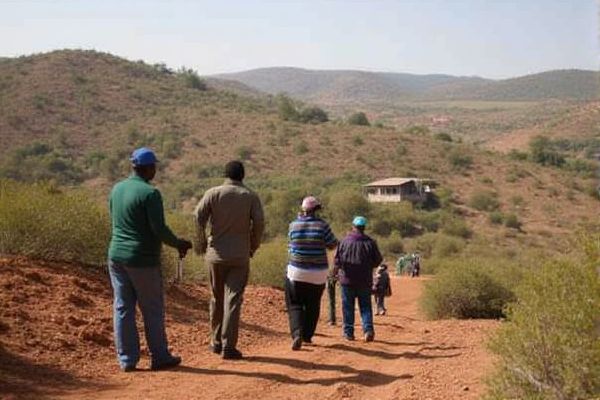
Ethiopia's economic landscape is witnessing significant growth, particularly in sectors like agriculture, construction, and technology. Project management opportunities are burgeoning, driven by the government's emphasis on infrastructure development and foreign investment. Professionals with skills in project planning, implementation, and monitoring find numerous roles within non-governmental organizations and governmental agencies. The demand for development-oriented expertise is also rising, as initiatives aimed at poverty alleviation and sustainable development take center stage.
Job Description
Development and project management jobs in Ethiopia often involve coordinating initiatives aimed at improving community welfare, educational access, and sustainable economic growth. These positions require skills in resource allocation, stakeholder engagement, and strategic planning to ensure successful project execution and alignment with national development goals. Experience in monitoring and evaluation is crucial, as it helps assess program impact and guide future projects. Opportunities vary across sectors, including non-profit organizations, governmental agencies, and private companies focused on social innovation and infrastructure development.
Requirement
Development and project management jobs in Ethiopia often require a combination of relevant educational qualifications and practical experience. Candidates typically need a bachelor's degree in fields such as development studies, business administration, or a related discipline. Proficiency in project planning, implementation, and monitoring is essential, along with strong communication and leadership skills. Familiarity with local contexts and regulations can greatly enhance your competitiveness in this growing job market.
Salary and Perks Expected
In Ethiopia, development and project management jobs typically offer competitive salaries that vary based on experience, qualifications, and the sector in which you work. Entry-level positions can expect a monthly salary ranging from 10,000 to 20,000 Ethiopian Birr, while more experienced professionals may earn upwards of 30,000 Birr. Along with salary, many organizations provide attractive perks such as health insurance, transportation allowances, and opportunities for professional development. The growing emphasis on sustainable development and international collaboration makes these roles increasingly valuable in the Ethiopian job market.
Similar Job Names
- Project Manager
- Program Coordinator
- Development Officer
- Monitoring and Evaluation Specialist
- Project Analyst
- Technical Project Lead
- Regional Project Manager
- Grant Writer
- Field Coordinator
- Project Development Manager
- Peacebuilding Specialist
- Training and Capacity Building Officer
- Community Development Manager
- Logistics and Operations Manager
- Partnerships Coordinator
- Research and Data Analyst
- Social Development Specialist
- Impact Assessment Officer
- Women's Empowerment Coordinator
- Infrastructure Project Manager
Job Expectation Concept
In Ethiopia, development and project management roles require a deep understanding of local contexts and challenges. Professionals are expected to navigate complexities related to socio-economic factors, ensuring that projects align with government policies and community needs. Effective communication with stakeholders is crucial, as collaboration with local partners and communities enhances the success rate of initiatives. Familiarity with monitoring and evaluation frameworks can greatly enhance your contributions to project outcomes and impact.
Career Advantage and Weakness
Development and project management jobs in Ethiopia present numerous career advantages, including the opportunity to make a significant impact on local communities and contribute to national progress. The growing emphasis on sustainable development and the backing of international organizations often lead to funding and resources, enhancing job security and career growth. However, these roles can also present weaknesses, such as limited resources and infrastructure challenges that may hinder project implementation. Navigating cultural dynamics and the political landscape can further complicate these positions, requiring a strong adaptability and local knowledge to succeed.
Important Thing Must Know
Development and project management jobs in Ethiopia are vital for driving progress across various sectors, including education, health, and infrastructure. The Ethiopian job market often emphasizes skills in planning, execution, and team leadership, making experience in these areas highly valuable. Understanding local cultural contexts and community needs can greatly enhance the effectiveness of project initiatives. Networking within local NGOs, government agencies, and international organizations can open doors to new opportunities in this field. Staying updated on government policies and development trends in Ethiopia will enhance your prospects and impact within the industry.
Alternative Career Options
Exploring alternative career options within the realm of development and project management in Ethiopia can lead to numerous fulfilling opportunities. Non-governmental organizations (NGOs) and international agencies frequently seek professionals for roles in program coordination, monitoring and evaluation, and community engagement. Government initiatives at various levels also offer positions in policy development, public administration, and infrastructure project planning. Expanding your skill set in areas like grant writing, data analysis, and stakeholder management can enhance your prospects in this dynamic job market.
Companies List
- Ethiopian Airlines
- Ethio Telecom
- Dashen Bank
- Commercial Bank of Ethiopia
- Addis Ababa City Administration
- Ministry of Education of Ethiopia
- Ethiopian Roads Authority
- Ethiopian Electric Utility
- Ethiopian Shipping and Logistics Services
- Ministry of Health of Ethiopia
List of Ideal City
Ethiopia offers several cities that are ideal for development and project management jobs. Addis Ababa, the capital, is a major hub for international organizations and NGOs, providing numerous opportunities in various sectors. Hawassa, known for its growing industrial parks, is rapidly becoming a center for investment and project management. Mekelle, despite recent challenges, remains significant due to ongoing development initiatives and opportunities in infrastructure projects.
 jobs-ethiopia.com
jobs-ethiopia.com